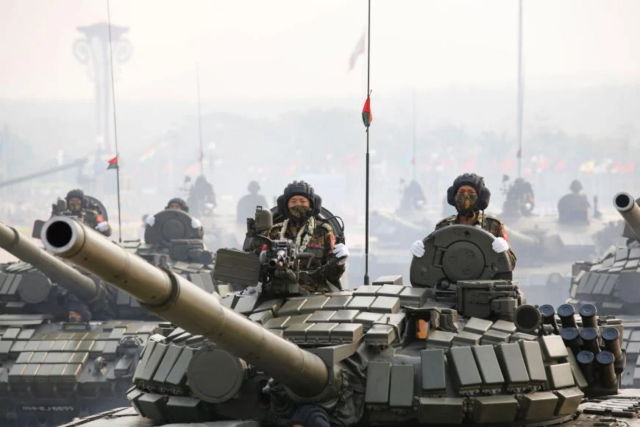Myanmar: Armed Forces Day Spotlights Atrocities
25 March 2022


Military personnel participate in a parade on Armed Forces Day in Naypyidaw, Myanmar, Saturday, March 27, 2021. © AP Photo
Stronger Economic Measures, Arms Embargo Needed Against Military
(Bangkok) – Myanmar’s Armed Forces Day on March 27, 2022, is an opportunity for foreign governments to take stronger action against the military’s widespread abuses, Human Rights Watch said today.
Concerned governments should strengthen economic sanctions against junta members and other senior military officers, as well as military-owned conglomerates. The United Nations Security Council should urgently adopt a global arms embargo against Myanmar and refer the country situation to the International Criminal Court.
“Governments joining Myanmar’s Armed Forces Day celebrations are celebrating the military’s brutal suppression of its own people,” said Manny Maung, Myanmar researcher at Human Rights Watch. “Governments should instead participate by enacting targeted sanctions against the generals and military businesses.”
On March 26, 2021, the state MRTV news channel announced that anti-coup demonstrators “should learn from the tragedy of earlier ugly deaths that you can be in danger of getting shot to the head and back” and warned that “parents should also talk their children out of it [joining protests], let’s not waste lives for nothing.” This language was widely interpreted to signal that the security forces were planning to respond with force to planned protests on March 27.
The next day, Myanmar security forces killed as many as 163 anti-coup protesters in deadly crackdowns. It was most likely the deadliest single day since country-wide protests broke out against the February 1, 2021 military coup.
Since the coup, security forces have killed over 1,600 people and detained more than 12,000. Over 500,000 people have been internally displaced and the junta is deliberately blocking aid to populations in need as a form of collective punishment. Human Rights Watch has documented the military’s numerous abuses against the population that amount to crimes against humanity and war crimes.
A joint report by Fortify Rights and the Schell Center for International Human Rights at Yale Law School, released on March 24, 2022, identifies 61 senior military and police officials who ordered abuses or are otherwise directly implicated in crimes committed against the population in the first six months after the coup.
In recent weeks, there have been increasing reports of Myanmar military airstrikes and use of heavy weapons causing civilian loss of life and property. The UN special rapporteur on human rights in Myanmar, in his February report on government sales of weapons to the Myanmar military, said that jet aircraft, attack helicopters, armored vehicles, light and heavy artillery, missiles, and rockets were being used against civilians. More than 400 of the attacks reported occurred in Sagaing Region in northwestern Myanmar, where most civilian fatalities have recently occurred. The report identified Belarus, China, India, Israel, Pakistan, Russia, Serbia, South Korea, and Ukraine as having transferred arms to Myanmar since 2018 that could be used to attack civilians.
Other countries such as Japan have not ended military ties and continue to provide training to the Myanmar military despite its long record of human rights abuses. Since 2015, Myanmar military cadets and officers have received academic and military training at Japan’s National Defense Academy and Japan Self-Defense Forces facilities. The Japanese government should immediately suspend the program and cut other military ties, or risk being complicit in the military’s atrocities.
The UN Office of the High Commissioner for Human Rights condemned Myanmar security forces’ violations of international human rights and humanitarian law in a March 15 report, and said the military was deliberately targeting civilians, many of whom were shot in the head, burned to death, arbitrarily arrested, tortured, or used as human shields.
On March 21, the US government formally determined that the Myanmar military committed the crime of genocide and crimes against humanity against ethnic Rohingya Muslims in Rakhine State. The US and like-minded governments should seek justice for grave international crimes against the Rohingya and other ethnic groups, as well as against the anti-coup protesters, and impose stronger economic measures against the military leadership, Human Rights Watch said.
The UN Security Council – largely because of concerns of a Chinese or Russian veto – has not taken substantive action in response to the Myanmar military’s atrocities. Nevertheless, the council should impose an arms embargo on Myanmar and refer the situation in Rakhine State to the International Criminal Court.
“The UN Security Council should act to help end the suffering of Myanmar’s people,” Maung said. “UN member countries should not keep waiting for the Security Council, however, and should take all possible action at the UN General Assembly and unilaterally to promote justice for Myanmar.”
Announcements
28 February 2025
Asian NGO Network on National Human Rights Institutions , CSO Working Group on Independent National Human Rights Institution (Burma/Myanmar)
Open letter: Removal of the membership of the dis-accredited Myanmar National Human Rights Commission from the Southeast Asia National Human Rights Institution Forum

Progressive Voice is a participatory rights-based policy research and advocacy organization rooted in civil society, that maintains strong networks and relationships with grassroots organizations and community-based organizations throughout Myanmar. It acts as a bridge to the international community and international policymakers by amplifying voices from the ground, and advocating for a rights-based policy narrative.